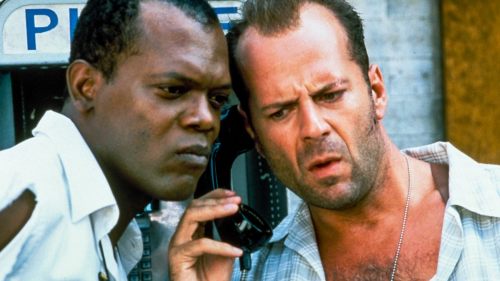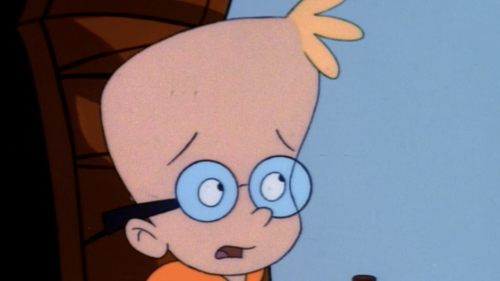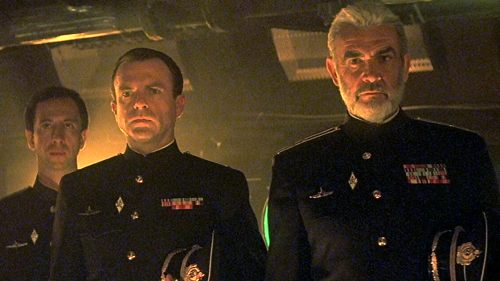DIE HARD Sequels Are A Hard Nut To Crack
Apparently, the trick to coming up with a good Die Hard sequel is to grab something unrelated and refashion it to include John McClane. And if you think I'm exaggerating, consider the fact that only one of the sequels began life as one: the abysmal, universally loathed A Good Day To Die Hard. The three superior sequels were all originally written as non-McClane stories: Die Harder was based on a novel called 58 Minutes (a novel unrelated to the one that inspired the first film, and by a different author to boot), and both DH3 and 4 were based on existing spec scripts that were refashioned to fit into the series. But A Good Day? As awful as it is, and as completely out of character as John McClane may appear - somehow that was always meant to be a Die Hard. Go figure.
The best proof of this theory comes from Die Hard With A Vengeance, many fans' favorite sequel (it battles with Die Harder; I prefer 3 but I can't argue much with Harlin fans). First, a bit of fun history: Die Hard 3 was originally going to be set on a cruise ship, but Under Siege stole its thunder and the script was canned. LA based stories (one involving the subway system) were commissioned, but those were rejected by Bruce Willis. Finally, Fox/Willis found a solution: Jonathan Hensleigh's spec script that was titled Simon Says, which was also considered to be reworked into the next installment of the Lethal Weapon series, and even at one point Rapid Fire 2 (!), a film that never existed at all due to the death of Brandon Lee. Apparently the idea of just making his original script into an original movie was too insane for anyone to consider, and once the script was reworked, Willis approved, and the rest is history.
But here's the funny thing: many would agree that the first half of the film is superior to the 2nd, when exciting but not particularly inventive action scenes and a truly weak finale replace the first half's emphasis on suspense and tension, with McClane never even drawing his weapon until past the hour mark. That's not to say it lacked action - the frantic drive through Central Park and the terrific subway scene, where McClane boards the moving train by jumping onto it from the street above, are fine sequences. But in between them are the things people really remember about the film: McClane and Zeus (Sam Jackson) running around New York, solving Simon's riddles and bickering as the other cops got to do the more fun stuff like find a bomb that Simon has placed somewhere in one of the city's schools. There's also the matter of why McClane is involved, revealed about 15 minutes before the movie starts to falter: Simon is none other than Simon Gruber, older brother to Hans Gruber, last seen racing a Rolex watch to the asphalt around the Nakatomi building. Of course, it's not JUST a revenge movie, as Simon has bigger plans, but the connection makes up for the fact that the movie lacks other ingredients from the first two films - namely Holly, Christmas, Al Powell (and Twinkies), and a more contained environment.
What's funny about that is that according to Hensleigh, the first hour is almost word for word what he originally wrote as Simon Says (barring the obvious character name changes). The second hour isn't as good and that's the stuff they changed to make it more Die Hard-y! Not that it's BAD, really (well, the ending is, but before you bring up the original ending that's on the DVD - that's not very good either), but once Simon's grand plan is revealed and McClane is once again running around shooting everyone in sight, it's less novel - this is the sort of stuff we've seen before, and it was nice to have an hour or so built around McClane's underutilized detective skills. His hangover prevents him from being too useful in the riddles, but he puts together a key part of Simon's plan (driving all of the police away from the Federal Reserve) and keeps track of things he learned earlier in the day (how the liquid bombs work, the stolen dump trucks) to help him later. By the time they're using a cable to make their way from a bridge to a moving ship, Willis and Jackson's chemistry is what's really keeping it afloat, not the story, and it's endlessly amusing to me that these scenes were the ones they spent time making sure lived up to the Die Hard legacy.
One cannot discount the importance of John McTiernan, who is just as essential as his stars in keeping the 2nd half from being outright bad. He is by far the best director of the four who have made these movies, and his ability to wring tension out of every situation is something the other films sorely lack. Check out the scene in Vengeance where McClane has to wear the racist sandwich board in Harlem - he holds the reveal of what it says until Zeus sees him, and from that point you sweat just as much as McClane, waiting for the inevitable moment where someone will take major offense to its message. Or the bit where McClane enters an elevator with four goons he's already pegged as being terrorists (his demeanor is way too chatty right off the bat - he knew long before he saw the badge that they were not who they said they were). To me, these bits are far more exciting than McClane spinning his car around to shoot some guys on some (suddenly rainy?) New York back road.
McT sat out Die Harder (Renny Harlin* did a pretty good job in his own right, but it's the action in that one that keeps the Blu-ray returning to the player - not the plot or character work), and paid it no mind here - I don't know how you can watch this movie and walk away with any plausible theory that McTiernan and co. were acknowledging Die Harder's existence at all. In Die Harder, John has moved to LA and taken a job with the LAPD, happily reunited with Holly and his children. Here, he's on the NYPD and his marriage is on even rockier terms than it was in the first film - there is no mention of their reunion or him working for the LAPD at all. The novelization does explain that he hated LA and went back to NY hoping to make it work long distance, but this quick factoid is delivered via John's inner monologue, as if the author was annoyed by the film's lack of explanation and added one himself - it seems a fairly important bit of catch up detail like that would have been explained on-screen/aloud, even if it was eventually cut. Continuity in the Die Hard series has never been its strong suit (at least two actors have played two characters, and McClane makes a joke about "another" Agent Johnson in DH4 even though he never met the first two), so the idea that the guy who directed 1 and 3 would choose to ignore 2 doesn't seem like a stretch.
Regardless, to me this is the closest thing we ever got, and probably ever will, to a truly satisfying Die Hard sequel. I enjoy the 2nd film a lot, but its frequent "It happens again!" plotting irritates me (why the hell is Dick Thornburg on that plane?), and again, it lacks any real character work for McClane. Live Free and A Good Day aren't even in the running (though, PG-13 edit or not, Live Free has by far the best callback to John's famous catchphrase), but with Vengeance - even with its lesser finale - I always feel like I'm truly seeing a new chapter in McClane's life when I watch it. When McClane pulls a very large splinter out of his arm with his bare teeth to use as a lockpick, I recognize the guy that had to drag himself into a bathroom in the original film, and his affinity for working class folk remained intact, something the next two sequels ignored entirely (particularly the 5th one, with McClane punching a random Russian guy for the crime of not speaking English). Sure, it woulda been nice if he reunited with Holly (or at least Al Powell) at the end of the film, but with each lesser sequel that followed, I grew to appreciate what Vengeance DOES offer all that much more.
*Fun fact: About 14 years after Die Hard w/a Vengeance, Harlin went on to direct 12 Rounds, a film that shamelessly ripped off its "Make the hero jump through hoops under the guise of revenge to distract everyone away from my robbery" plot, right down to intentionally crashing a moving vehicle even though the hero did things right. I don't know if this was his revenge for not being asked back for Vengeance, or just a hilarious coincidence, but either way I find it highly amusing.



